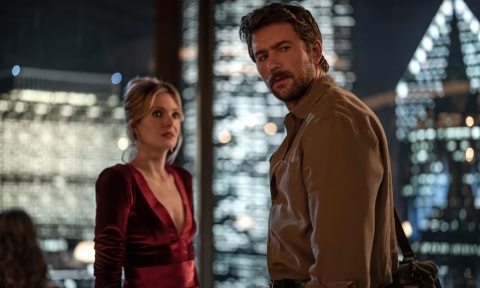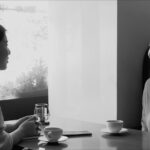One of the great incentives of going to the cinema is that it is one of the last few refuges — along with church and an airport security screening — where you are not really allowed on your smartphone. By sheer virtue of the location, you are separated from the incessant whirr of messages. Your irritating family WhatsApp group. Your terrifying work Slack. Emails from a place you bought shoes from once!
What a displeasure, I found, sitting down to watch Drop (Christopher Landon, 2025) — phone firmly stowed away — only to find that this is a movie almost entirely about a woman incessantly texting. Piling needless contrivance upon needless contrivance, this torturous first-date-from-hell movie is further proof of the real difficulty of making the smartphone a truly cinematic instrument.
Violet (Meghann Fahy), a survivor of domestic abuse, is about to go on a first date with a man she met on a dating app. She is incredibly nervous and practically has to be pushed out of the house by her sister, Jen (Violett Beane), who is looking after her son, Toby (Jacob Robinson). Thankfully for her, like any good helicopter mother, the entire house is wired with more security cameras than the average American embassy, allowing her to see practically every single angle of the house.
This at-home panoptican is complemented by the circular construction of her date location: Palette, a swanky restaurant on the 38th floor of a Chicago skyscraper. It’s the kind of place where everyone can see everyone, making each guest a suspect when, during her dinner with Henry (Brandon Sklenar), she receives a mysterious “drop” from a stranger, inviting her to play a displeasing game. Quickly, she is glued to her phone, and by extension, so are we…
Unsurprisingly, Drop cannot find a way to make a woman receive messages on her smartphone — a banal activity that happens to the average person at least 46 times a day — genuinely interesting.
For a long time, the phone call worked so well as a cinematic device because the phone was a place that people had to get to. Dial M for Murder (Alfred Hitchock, 1954) with its iconic black rotary phone. Jackie Chan tangled between different landlines in his Police Story (1985). Staci Keanan talking to a creep in Lisa (1990) on the family phone. On the modernish thriller side, I think of Phone Booth (Joel Schumacher, 2002), where Colin Farrell’s character is literally locked into a singular location, or my favourite, Cellular (David R. Ellis, 2004), where the kidnapped Kim Basinger makes an adhoc connection with busted wires, kicking off a ludicrously entertaining chain of non-stop, propulsive action.
But with an iPhone or an Android phone or whatever, you can just take the phone with you, its own rectangular screen a competitor for any film’s vision as opposed to a genuine co-collaborator. And while phones pre-2007 were devices used primarily to make calls, smartphones are everything devices, a reminder of life’s everyday banality, as opposed to its limitless potential. Watching Violet surreptitiously talk and text at the same time is less a thrilling time at the movies than an unwelcome reminder of the modern world’s increasing detachment from in-person connection.
Maybe a genius like the late Larry Cohen, who co-wrote Phone Booth and came up with the plot of Cellular, could do something interesting with this kind of material. Or David Fincher, who is just as cynical as the moment. Someone really clued into the state of life right now. With Christopher Landon behind the camera, Drop is a genuine nightmare.
The constant cutting doesn’t help; simple one-two dialogue chopped and hacked into pieces by relentless TikTok feed editing. It gets even worse once guns are drawn, the action sequences the true definition of going-through-the-motions. Not once do we get a steady feel for tone or character; the entire film is just one frustrating wheeze after another. Even the bits where they try and make the texts come to life, big words blasting across the screen, feel super tired. Our phones might be getting smarter, but they’re also making our movies dumber. This is even worse than Carry-On (Jaume Collet-Serra, 2024).

Redmond is the editor-in-chief of Journey Into Cinema.




